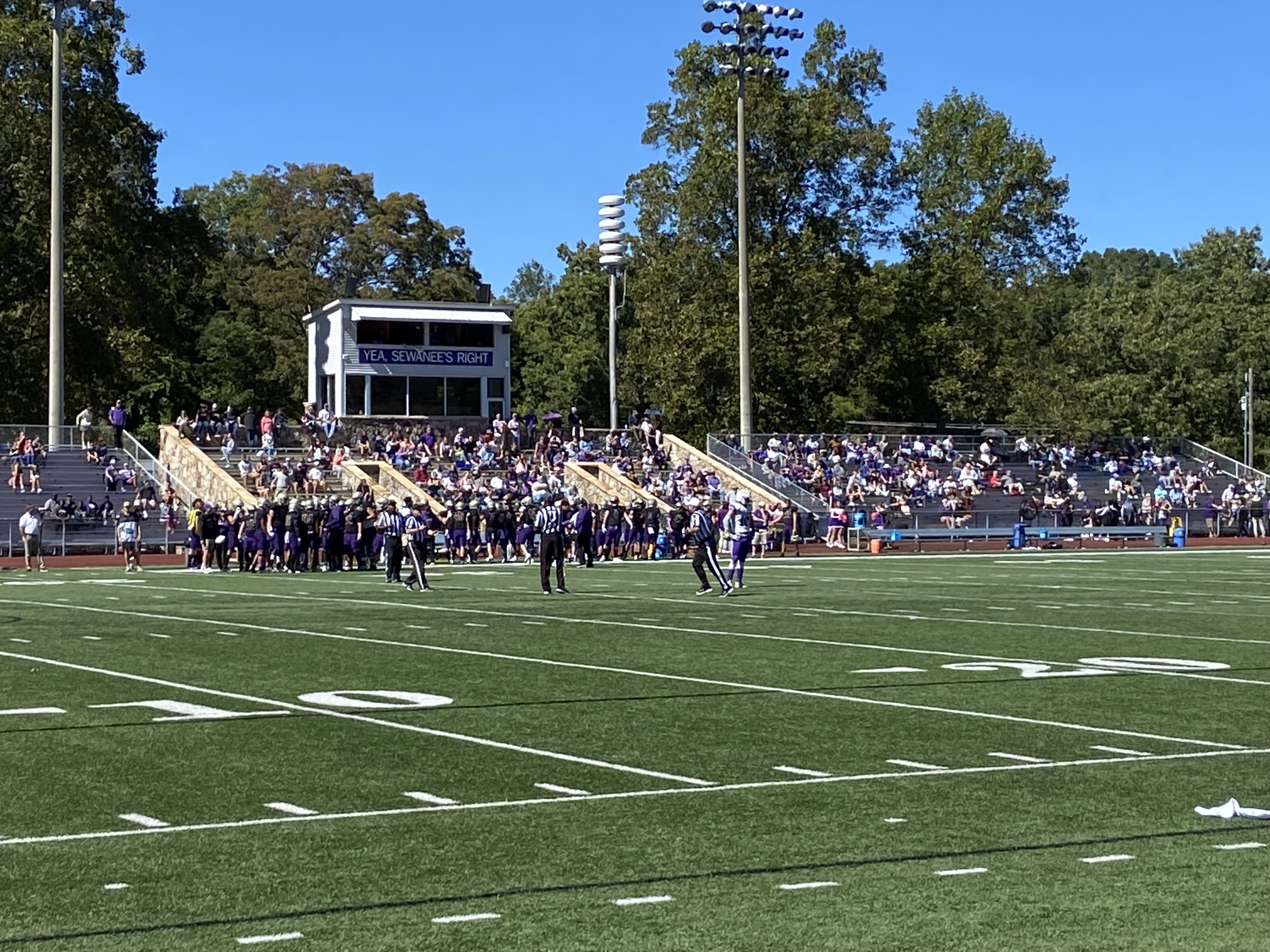SEWANEE, Tenn. — This is a place and a football setting unaffected by the frantically changing world around it.
Atop Monteagle Mountain, just off Highway 41A, past the Amish Hippie gift shop and Mooney's Market, the University of the South — more commonly known simply as Sewanee — is home to arguably the most picturesque campus in the Chattanooga area.
Nestled inside a leafy cocoon of rust-red maple trees and yellowing oaks is a tailgating scene that, were it not for the smattering of electric vehicles and cellphones in hand, would conjure images of a decades-old Norman Rockwell painting. The campus' lone traffic light's constant blinking yellow reminds visitors to not only drive slowly along the shaded streets but also to slow the pace of their day.
I love everything that is nostalgic about college football. The pomp and passion that begin at pregame and last well past the final outcome. The frenzy and fervor, commotion and emotion of 90,000-plus fans rising together inside a stadium to create ear-splitting noise.
But every so often, to wash away the complications that have stained the current version, it is good to return to the game's roots. And to mine.
My first college beat as an eager, know-nothing young reporter in the early 1990s was to cover Sewanee football. For three seasons, I wedged myself inside the cramped, Cracker Jack box-sized press box — where no matter where you sat, everyone was within earshot of assistant coaches calling out instructions to the on-field staff into their headsets.
So with no other college football being played in our area (the University of Tennessee had Saturday off and the University of Tennessee at Chattanooga made a three-plus-hour road trip), I decided to spend an afternoon taking in a game at a place that drips with memories — both personal and those linked to college football's past.
This is, after all, a program that famously once won five games in six days — and on the seventh day they rested — traveling by train to post shutouts over Texas, Texas A&M, Tulane, LSU and Ole Miss from Nov. 9-14, 1899.
Sewanee finished unbeaten that season, and our own David Paschall wrote about it on the 100-year anniversary of the feat.
The Tigers were also a charter member of the Southeastern Conference in 1932, although by the time the league was formed Sewanee was no longer able to keep up with the money machine behind other programs and exited having been shut out in 26 of 37 conference games, never posting an SEC win in eight years.
The only remnants remaining from that era is the school's official cheer, which began as an insult directed at rival Vanderbilt and is still recited during games: "Rip 'em up! Tear 'em up! Leave 'em in the lurch. Down with the heathen, up with the Church — Yea, Sewanee's right!"
There's an understated charm that surrounds not only the campus in general but the quaint 131-year old, 1,200-seat Harris Stadium — the oldest in the South still in use.
"This place is exactly how a university should be," said Joan Witschey, who along with her husband Walter made the eight-hour drive from their home in Farmville, Virginia, to watch their grandson, senior defensive end Alex Paris, and his Sewanee teammates fall to Southern Athletic Association rival Millsaps 30-27 on a cloudless, blue-sky day.
"This is our first time to get to watch him play here," Witschey added as people walking their dogs along the campus stopped to watch a few plays from the game before returning to their afternoon stroll. "We drove up on Thursday and toured the campus Friday and just fell in love with this place. It's tucked away on a gorgeous campus and sheltered from the rest of the world so students can focus on their intellectual pursuits."
The Tigers have nine players from the Chattanooga area on the roster, including senior running back Mike McGhee, a former Central High School star who is now a team captain and the Tigers' leading rusher, as well as a member of the Sewanee Volunteer Fire Department.
At NCAA Division III programs like this one, the transfer portal, NIL deals and debates over expanding the playoff system are not a part of the lexicon. Coaches don't worry about checking the classroom attendance or academic performance of the players.
"Our kids are definitely driven to be successful academically and on the field," said Tigers head coach Travis Rundle, who spent seven seasons on the Penn State defensive staff and is now in his sixth season at Sewanee. "The players are here because they love playing the game. That makes it fun to be around those type guys.
"For our players, every game has the same intensity level that you would see at bigger schools, just on a smaller scale."
There's nothing small about the experiences the program provides for some of its players, such as defensive back Kabal Caldwell, a junior from Atlanta who approached Rundle to apologize after a recent practice.
"I had no idea what he meant or what he was apologizing for," Rundle said. "Then he told me that he was going to be leaving to study abroad. He thought I would be disappointed, but I had a huge smile on my face because here's a kid who's a first-generation college student from his family that is now getting the opportunity to go to New Zealand to study.
"I gave him a hug and just said 'Hell yes!' because that's the type unique experiences we want for our kids who come here."
Contact Stephen Hargis at shargis@timesfreepress.com or 423-757-6293. Follow him on Twitter @StephenHargis.

